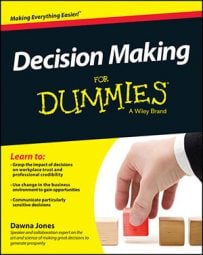To increase your ability to access and interpret inner guidance when you need it most, you can develop your intuition muscles. Here are some suggestions:
Make decisions. Don’t wait to be perfect. The more experience you have making decisions, the better. Whether your decision proves to be right or wrong helps you know what works under specific circumstances. When you’re right, pat yourself on the back. When you’re wrong, take time to reflect on how you made the decision and what you based your final conclusion on so that you can learn.
Reflecting on decisions that proved to be flawed works with decisions you make solo, with team decisions, and with organizational decisions on a larger scale.
Explore your beliefs to discover whether they are limiting your perception or helping it. Limiting beliefs reduce your capacity to perceive other information that can inform your decision-making, both consciously and unconsciously. The most entrenched belief in business, for example, is that only profit matters. If you ascribe to this limiting belief, you may overlook other key factors in your business’s success, such as community goodwill or customer satisfaction.
Most beliefs are stored in your subconscious, meaning that you may not even be aware of them yourself. Therefore, try listening to what you say. Doing so can give you insight into the beliefs that may be subconsciously impacting your decision-making.
For instance, if you hear yourself saying, “Self-organized teams are out of control” or “Command and control is the only way,” you may discover that your core belief is that controlling people creates performance. With that awareness, you can reexamine your convictions and open up to alternatives or even experimentation.
Learn how to regulate your emotions so you can listen to yourself. When your stress is high, your decision-making efficacy is low. Many tools are available to help you control your emotions: meditation, yoga, a walk in nature, time with pets, and deep breathing are some tried-and-true methods to help you achieve and attain daily balance.
All involve helping you achieve inner peace so that your feelings and your mind can work together.
Practice predicting what will happen next. It’s a chance to sharpen your senses and strengthen accuracy on what you’re detecting from your environment. Start by trying to predict which elevator will arrive first, or guess who is calling before you answer the phone. Or listen to your inner voice to help you see ahead. You may discover that you’ve picked up on something significant!
Improving your intuitive powers is a process, not a project, so forget about hoping you can study decision-making intuitive intelligence once and then be done. Becoming a better decision-maker takes time and attention no matter what age or stage you are at in your career or life.

